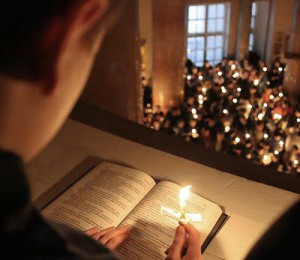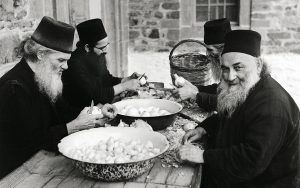 During the weekdays of Great Lent and on the days of lesser fasts, when office with Alleluia is served, as well as on the days when vespers is served in the afternoons, the ustav prescribes Great Compline. On the first four days of Great Lent, Great Compline is served with the reading of the Canon of Venerable Andrew of Crete divided into four parts.
During the weekdays of Great Lent and on the days of lesser fasts, when office with Alleluia is served, as well as on the days when vespers is served in the afternoons, the ustav prescribes Great Compline. On the first four days of Great Lent, Great Compline is served with the reading of the Canon of Venerable Andrew of Crete divided into four parts.
The order of Great Compline basically consists of psalms and is divided into three parts. The first part includes six psalms and the gorgeous hymn “God is with us” taken from the Book of Isaiah. The second part also includes psalms and the prayer of King Manasses taken from the Second Book of Chronicles. In the third part are included Psalms, the Doxology, and a canon to the Mother of God followed by the special hymn “O Lord of Hosts, be with us” with verses of Psalm 150. The ustav indicates it must be chanted very loud and slow.
On the first four days of Great Lent, the Canon of St. Andrew of Crete is chanted during Great Compline, but this not during the final part of Great Compline but in the very first part. The service begins with the words “Blessed is our God,” the common beginning, and then Psalm 69 is chanted. This psalm belongs to the third part of Great Compline but is transferred into the beginning during these four days and is not repeated at its common place. Psalm 69 is then followed by the reading of the Canon of St. Andrew of Crete.
The Great Canon is a wonder of all church hymnography; these words are of amazing energy and beauty. It begins as addressed to Christ, “Where shall I begin to lament the deeds of my wretched life? What first fruit shall I offer, O Christ, for my present lamentation?” How shall I start to repent for it is so difficult? Then the famous troparion follows, “Come, wretched soul, with your flesh, confess to the Creator of all.” These are wonderful words in which both Christian anthropology and asceticism are found: the flesh must take part in repentance as well, for it is an essential part of human nature.
By its content, the Great Canon presents a talk of a penitent with his soul. From the very beginning he speaks to his soul, “Come, wretched soul, with your flesh, confess to the Creator of all. In the future refrain from you former brutishness, and offer to God tears of repentance.” These conversations with the soul, constant persuasions, and appeals to repentance reach their climax in the kontakion which is chanted after the sixth hymn:
“My soul, my soul, arise! Why art thou sleeping? The end draws near and soon thou shalt be troubled. Watch, then, that Christ thy God may spare thee, for He is everywhere present and fillest all things.”
Among the basic features of the Great Canon, we should note the extremely wide use of characters and scenes from the Bible, both the Old and New Testaments. Constant admonition of the soul is made with these examples: remember this righteous man, he pleased the Lord in such a way; remember that holy man, he pleased Him in this way and you have not done anything like that.
The very first troparia remind us of Adam and Eve and of a great many biblical characters: Moses, Aaron, Abraham, Joseph. Some are shown in positive way; others are shown in negative way. You should follow the example of some of them, and some of them you should not follow.
“Elijah the charioteer once ascended by the chariot of the virtues as to heaven and was carried above earthly things. Consider then, my soul, this ascent.”
“You have always imitated the vile mind of Gehazi, O wretched soul. Rid yourself of his love of money, at least in old age; escape from the fire of Gehenna by leaving your evil ways.”
As you can see, the texts are rather difficult; thus, one should prepare in advance to perceive the Great Canon.
In the final song of the first day, the reminiscences are followed by the troparia with wonderful energy, “The Law has grown weak, the Gospel is unpracticed, the whole of Scripture is ignored by you; the Prophets and every word of the just have lost their power. Your wounds, my soul, have multiplied, and there is no physician to heal you” – there is nothing to remember from the Old Testament, everything is in vane. I will give you examples from the New Testament, so maybe you will repent after that: “I am bringing before you examples from the New Scripture, my soul, to lead you to compunction. So emulate the righteous and avoid following the sinners, and regain Christ’s grace by prayers, fasts, purity, and reverence.”
The most desperate sinners have repented and will get to Heaven ahead of you, “Christ became man and called to repentance robbers and harlots. Repent, my soul! The door of the Kingdom is already open, and the transformed pharisees, publicans, and adulterers are seizing it ahead of you.”
The Great Canon, while by all means leading us to the repentance, is likely to reveal its “technique” in the last troparia: how I conversed with you, my soul; I remembered Old Testament righteous ones and I held up New Testament characters as an example, but everything was useless, because their “deeds and life, my soul, you have not emulated. But woe unto you when you are judged!”
At the end of Great Compline, the order of mutual forgiveness is carried out. It is similar to that which was fulfilled on the previous Sunday night. After the last prayers of Great Compline it is said: “The primate makes a prostration to the floor saying to the brethren, ‘Bless, holy fathers and forgive me a sinner, all wherein I have sinned this day in deed, word, and thought, and by all my senses.” And the brethren reply, “May God forgive and have mercy on thee, holy father.” Thus, the service of the first week puts us in Great Lent; it trains, inspires, and entreats, turning us to Lenten struggles.
By M.S. Krasovitskaya. M.S. Krasovitskaya, Senior lecturer, Department of Liturgical Theology, St. Tikhon’s Orthodox University of Humanities, author of a course of lectures in liturgics.
Translated by Kira Stebunova
Edited by Jacob Aleksander Brooks and Isaac (Gerald) Herrin
















